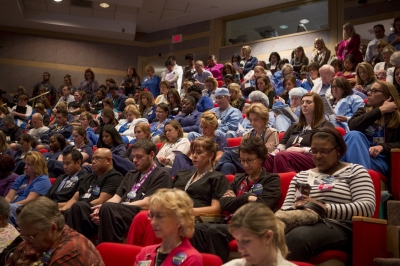Texas Ebola nurse identified, up to 70 Presbyterian Hospital staff could have been exposed

DALLAS (Christian Examiner) -- USA Today, Oct. 13, identified the nurse infected by Thomas Eric Duncan, the first patient diagnosed with the Ebola virus in the U.S., as Nina Pham.
Meanwhile, fears and concerns about a possible outbreak led hospital administrators to hold town hall meetings with hospital staffers later in the day.
On Oct. 12 Texas Health Presbyterian Hospital in Dallas announced a caretaker for Duncan—who died Oct. 8 from the Ebola virus barely 13 days after developing symptoms—had been infected, but had declined to name Pham.
A flap ensued the same day over remarks by the director of the U.S. Centers for Disease Control and Prevention, who blamed a "breach in protocol" for the nurse's infection. Thomas Frieden clarified in a later briefing he was talking about addressing what needs to happen to prevent infection and not faulting the nurse or the hospital—indicating a possible weakness in protocols.
Wendell Watson, spokesman for Texas Health resources said Pham had been under self-monitoring prescribed by the CDC, based on her caring for Duncan during his inpatient care that started on September 28. She developed symptoms Friday, Oct. 10; was tested Saturday; and lab results on Sunday confirmed her symptoms were the result of Ebola infection.
"The patient's condition is stable," Watson said, adding that a "close contact has also been proactively placed in isolation."
The close contact is still unnamed.
However exposure fears were greatly amplified when the Associated Press released information Oct. 13 indicating a large cohort of health professionals had been part of Duncan's caretaking team.
Martha Mendoza, AP national writer, said up to 70 hospital staff members were part of the isolation team who had possible contact with Duncan.
"They drew his blood, put tubes down his throat and wiped up his diarrhea," she said in summarizing medical notes she examined.
Saying "the size of the medical team reflects the hospital's intense effort to save Duncan's life," she also suggested it showed the growing number of people who could have been exposed to the virus.
Fears about exposure were heightened by Watson's announcement over the weekend about closure of emergency room operations.
In the same announcement about an infected caretaker, he said the emergency room would be placed in diversion status—no patients would be brought in by ambulance—because of "limitations in staffed capacity."
Nearly 12 hours later, Presbyterian announced emergency room operations had resumed, only to close operations again less than half an hour after reopening.
Responding to obvious confusion, fears, concerns and grief, Texas Health Resources CEO Barclay Berdan spoke with caretakers and staff members in a series of town hall meetings Oct. 13.
Berdan encouraged hospital workers not to lose sight of "the compassion and selflessness" Pham and others demonstrated in caring "for others infected with this insidious disease."
Saying that the focus now needed to be on taking care of "our patients and each other," he also reassured the groups that THPH was "working on all levels with the CDC to coordinate all care related issues, and now we're working closely to provide information about precautions, care and treatment that are consistent and understandable for patients, caregivers, family members and all Americans who are concerned about how this disease is transmitted and treated."
As for Pham's prognosis, the Washington Post reported Oct. 14 Pham had received a blood transfusion with Ebola antibodies late Monday.
Physician and missionary Kent Brantly who survived an Ebola infection in July donated the blood to Pham.
Some Ebola patients have been treated with the experimental drugs ZMapp, a cocktail of three antibodies, or brincidofovir. But there are no more doses of ZMapp in the world and brincidofovir did not work on Duncan, who infected Pham.
Brantly himself received a similar blood transfusion while he was in Liberia and before he received a dose of ZMapp according to the Post.
In a statement released through Watson today, Pham said she was "doing well" and "blessed by the support of family and friends" and to be cared for "by the best team of doctors and nurses in the world here at Texas Health Presbyterian Hospital Dallas."